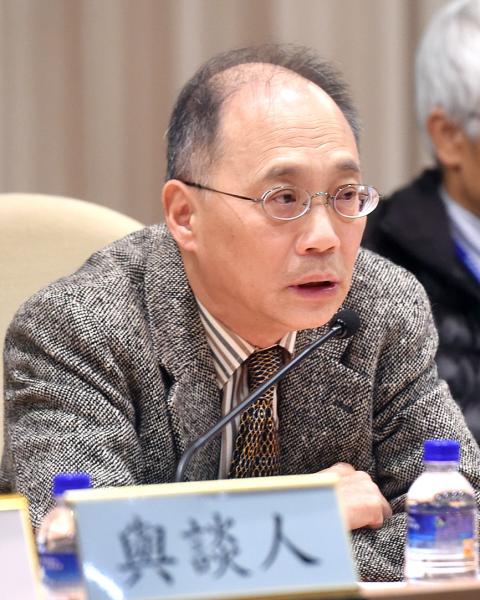INTERVIEW
The Act on Promoting Transitional Justice (促進轉型正義條例), which was passed on Tuesday, is a move toward a mature democracy and not about exacting revenge, Academia Historica director Wu Mi-cha (吳密察) said in a recent interview with the Liberty Times (the sister newspaper of the Taipei Times).
The Executive Yuan is required by law to establish an ad hoc committee to implement transitional justice measures set forth under the law, including the retrieval of political archives held by the Chinese Nationalist Party (KMT), which could significantly add to the understanding of the era.

Photo: Chien Jung-fong, Taipei Times
According to the law, political parties and affiliated organizations are obligated to hand over archives determined by the committee to be national archives or face a fine of between NT$1.5 million and NT$5 million (US$49,975 and US$166,583). The fine can be repeated if necessary.
Wu said the KMT should respond to the act by drawing on historical records in its possession to show that the party has changed.
The act is an important part of Taiwan’s democratization and liberalization processes, Wu said, adding that the Democratic Progressive Party was unable to promote the act when it first came to power in 2000, as it did not have a majority in the legislature.
The KMT showed no interest in promoting transitional justice when they returned to office in 2008, despite claiming to be different from the KMT of the past, he added.
Whether the act can be successfully implemented now will be a test of the maturity of the nation’s democracy, Wu said, adding that a democracy that is defined merely as the election of one out of a few individuals is not a good democracy.
“If this is done well, then no individual or party will be held accountable for past crimes,” Wu said.
Many KMT party members today rely on the support of local constituencies, and there is no need for them to bear the burden of the party’s past crimes, he said, adding that, conversely, the KMT can borrow from the impetus of the transitional justice process and win support by showing commitment to its efforts.
Reports that government divisions made to the central government during the authoritarian period provide important records of the time, Wu said, citing communications between the then-Taiwan Province governor and the central government in China’s Nanjing during the 228 Incident.
The public also has yet to see documents detailing the “blacklisting” of some overseas Taiwanese students by the KMT, he said, adding that such documents would have been kept by the party’s overseas affiliate organizations at the time.
Wu said that many overseas students of the time found themselves unable to enter public universities or the Academia Sinica upon returning to Taiwan, even when their academic records had passed inspection.
Collecting and making public the records of those blacklisted students, which are spread out among various organizations, would provide a more complete historical picture, he said.
“In any nation where public records are hidden away or destroyed, people are going to be distrustful of the government,” Wu said.
“Therefore, it is imperative that whatever organization is tasked with managing government documents has the public’s trust,” Wu said, adding: “Document declassification processes must be transparent and systematic, with progress and access restrictions being clearly explained.”
The process of accessing government records must be simple to reduce public distrust, Wu said.

An essay competition jointly organized by a local writing society and a publisher affiliated with the Chinese Communist Party (CCP) might have contravened the Act Governing Relations Between the People of the Taiwan Area and the Mainland Area (臺灣地區與大陸地區人民關係條例), the Mainland Affairs Council (MAC) said on Thursday. “In this case, the partner organization is clearly an agency under the CCP’s Fujian Provincial Committee,” MAC Deputy Minister and spokesperson Liang Wen-chieh (梁文傑) said at a news briefing in Taipei. “It also involves bringing Taiwanese students to China with all-expenses-paid arrangements to attend award ceremonies and camps,” Liang said. Those two “characteristics” are typically sufficient

A magnitude 5.9 earthquake that struck about 33km off the coast of Hualien City was the "main shock" in a series of quakes in the area, with aftershocks expected over the next three days, the Central Weather Administration (CWA) said yesterday. Prior to the magnitude 5.9 quake shaking most of Taiwan at 6:53pm yesterday, six other earthquakes stronger than a magnitude of 4, starting with a magnitude 5.5 quake at 6:09pm, occurred in the area. CWA Seismological Center Director Wu Chien-fu (吳健富) confirmed that the quakes were all part of the same series and that the magnitude 5.5 temblor was

The brilliant blue waters, thick foliage and bucolic atmosphere on this seemingly idyllic archipelago deep in the Pacific Ocean belie the key role it now plays in a titanic geopolitical struggle. Palau is again on the front line as China, and the US and its allies prepare their forces in an intensifying contest for control over the Asia-Pacific region. The democratic nation of just 17,000 people hosts US-controlled airstrips and soon-to-be-completed radar installations that the US military describes as “critical” to monitoring vast swathes of water and airspace. It is also a key piece of the second island chain, a string of

The Central Weather Administration has issued a heat alert for southeastern Taiwan, warning of temperatures as high as 36°C today, while alerting some coastal areas of strong winds later in the day. Kaohsiung’s Neimen District (內門) and Pingtung County’s Neipu Township (內埔) are under an orange heat alert, which warns of temperatures as high as 36°C for three consecutive days, the CWA said, citing southwest winds. The heat would also extend to Tainan’s Nansi (楠西) and Yujing (玉井) districts, as well as Pingtung’s Gaoshu (高樹), Yanpu (鹽埔) and Majia (瑪家) townships, it said, forecasting highs of up to 36°C in those areas